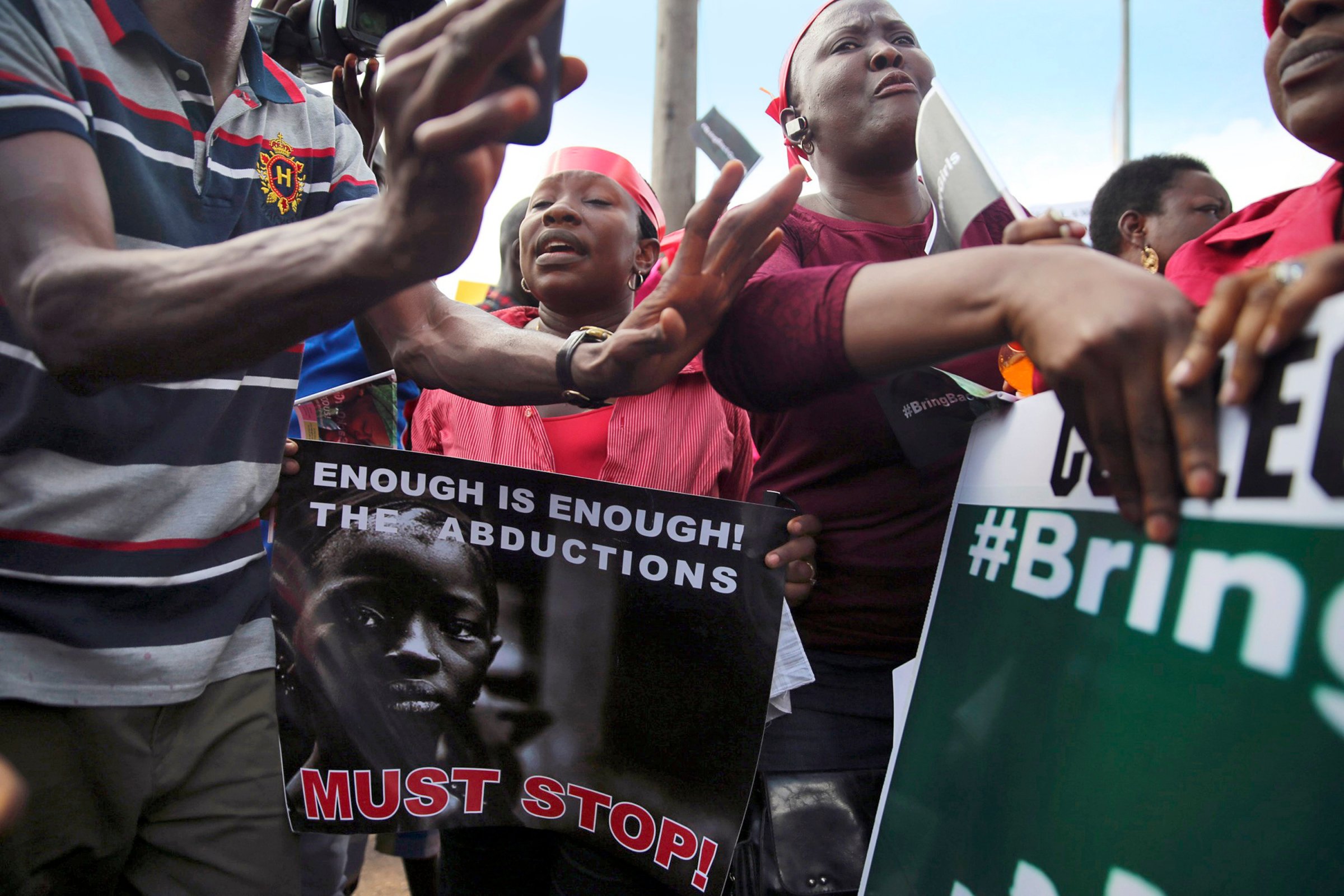
When members of the Islamist terrorist group Boko Haram showed up at a girls’ high school in the town of Chibok in northeastern Nigeria one night last month, the girls were confused. The militants had dressed themselves in military uniforms and told over 300 schoolgirls they were taking them to a secure location. But it became clear not long after the men loaded the girls into trucks to take them to remote camps that the girls were being kidnapped. Nearly all the schools in the northeast had closed after a series of Boko Haram attacks, including a recent one in which the group murdered the boys and told the girls to go get married. Education officials in Borno state, where Chibok is located, decided to open the school for final exams.
The school’s principal says 53 girls escaped. Some of the escaped girls say militants forced them to cook, clean, and gather firewood and water. In the days after the kidnapping, the Nigerian military falsely announced it had rescued the girls. But on May 5, Boko Haram released a video claiming responsibility for the abduction; leader Abubakar Shekau called the girls “slaves” and said the group would “sell them in the market.” Parents have told Time they are trapped in a hellish limbo, with no information from the government or military on the location and condition of their daughters. “We are praying for the government to rehabilitate the ones who are able to gain freedom,” said one Chibok resident. “Something has to be done to integrate them into society because their lives have been damaged.”
What many outside the northeast do not realize is that the Chibok kidnapping, while the largest, is just one of many abductions by Boko Haram of girls and young women in the region. In April, on the highway between the northeastern cities of Maiduguri and Damaturu, militants forced girls to leave cars and carted them away in their own vehicles. In February gunmen kidnapped 20 girls from a school in the town of Konduga and another five girls selling goods on the street. None of the Konduga girls have returned. The group has also taken girls from homes in Maiduguri and farms in remote villages.
Of the unknown number of girls the militants have abducted over recent years, some have escaped and others rescued during military raids on Boko Haram camps. “Almost all of them came back either pregnant or with very young babies,” Mausi Segun, Nigeria researcher at Human Rights Watch, tells Time. “There is no sign that the girls are being killed.” Instead, the terrorist group uses the girls as sex slaves, and sometimes the girls eventually find their way home. In the case of Chibok, Boko Haram also specifically wanted to prevent the girls from going to school.
Public reaction to the sporadic kidnapping of girls in the past has been muted, at best. Besides the pleas of distraught relatives and community officials, the rest of Nigeria has been mostly silent. “There has never been a huge urgency on the part of the military to recover the girls,” says Segun. This could partly explain why President Goodluck Jonathan and the military have appeared to act so slowly and inefficiently. They assumed Nigerians would not care.
They were wrong. Not long after the Chibok kidnapping, the Twitter hashtag #BringBackOurGirls emerged. The young age of the victims, the sheer number taken and the girls’ uncertain fate galvanized Nigerians, and soon after Twitter users around the world, to tweet Nigerian and international politicians and media to push them to say and do something about the abduction. The social-media campaign led to actual protests. Hundreds of people, including some of the mothers of the Chibok girls, participated in public protests.
Africa has a long tradition of its girls disappearing without much attention. The stereotypical image of children in African conflicts is the boy soldier. But in Uganda, for years the Lord’s Resistance Army (LRA), an extremist Christian group, abducted thousands of girls and forced them to become sex slaves; the LRA still kidnaps girls in the Central African Republic. When these young women escape, lives of isolation and stigma within their former communities await them. Some of the women who have left the clutches of Boko Haram, especially the ones with children, are ostracized once home, or their families send them to distant cities. If the Chibok schoolgirls also make it home, their ordeal will not yet be over.
More Must-Reads from TIME
- Donald Trump Is TIME's 2024 Person of the Year
- Why We Chose Trump as Person of the Year
- Is Intermittent Fasting Good or Bad for You?
- The 100 Must-Read Books of 2024
- The 20 Best Christmas TV Episodes
- Column: If Optimism Feels Ridiculous Now, Try Hope
- The Future of Climate Action Is Trade Policy
- Merle Bombardieri Is Helping People Make the Baby Decision
Contact us at letters@time.com